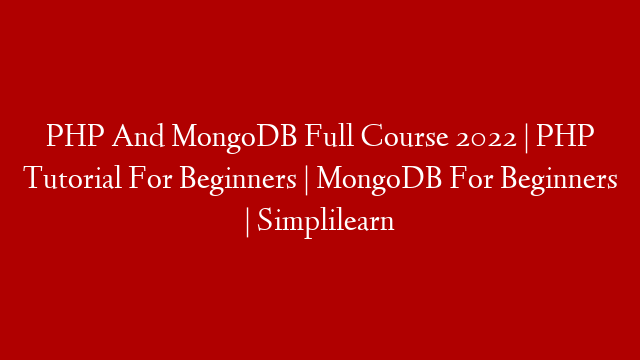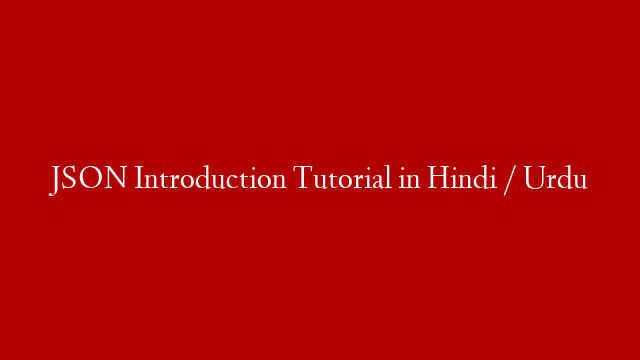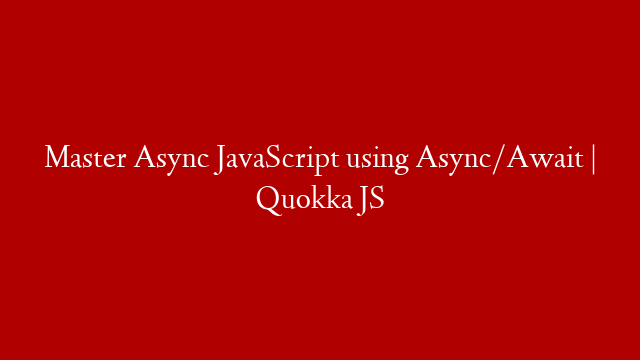🔥Explore our FREE Courses with Completion Certificate:
This PHP and MongoDB full course video covers all the key concepts of PHP including an introduction to PHP, hello world in PHP, OOP in PHP, PHP with MySQL, PHP form validation, PHP get and post methods, PHP crud operations, PHP form login, PHP vs Python, PHP rest API, PHP registration for VSCode, PHP programming, along with most important PHP interview questions.
✅Subscribe to our Channel to learn more about the top Technologies:
⏩ Check out our PHP training videos playlist:
#PHPFullCourse #PHPForBeginners #PHPTutorialForBeginnersFull #PHPFullTutorial #LearnPHP #PHP #PHPForBeginners #PHPForBeginners #PHPTutorial #PHPTutorialForBeginners #MongoDBTutorial #MongoDBTutorialForBeginners #MongoDBCourse #LearnMongoDB #MongoDBTraining #Simplilearn
What is PHP?
Despite being an old language, PHP still comprises 79.8% of all web applications that nearly translates to 20 million websites and 2 million web servers. According to zdnet.com, the demand for PHP developers has also massively increased to 834% since January 2020. PHP stands for Hypertext Preprocessor. It is an open-source server-side scripting language used for dynamic web development and can be embedded into HTML codes.
Some of the major benefits of using PHP are:
1. It is an open-source language. This means that PHP is freely available to use and implement.
2. It is an easy-to-learn language. Since it is very similar to how HTML codes are written, it is easy to understand and implement.
3. It is highly compatible since it can be integrated with multiple programming languages such as HTML, Javascript and supports different databases like MySQL, PostgreSQL, Oracle, etc.
4. It is platform-independent, which means that applications developed using PHP can run in any environment.
5. It has a large community of developers. Programming is all about helping and being helped; hence a large community would mean more help.
To learn more about PHP, check our Full Stack Web Developer program:
What is MongoDB?
MongoDB is a document-oriented, no sequel (NoSQL) database. MongoDB helps avoid the concept of “rows” of conventional relational data models with the introduction of “documents.” This provision offers developers to work with evolving data models too.
MongoDB Certification Training Course:
More businesses are using MongoDB development services, the most popular NoSQL database, to handle their increasing data storage and handling demands. The MongoDB certification course equips you with the skills required to become a MongoDB Developer. MongoDB certification course makes you job-ready by helping you master data modeling, ingestion, query, sharding, and data replication with MongoDB, along with installing, updating, and maintaining the MongoDB environment. You will also gain proficiency in MongoDB configuration and backup methods as well as monitoring and operational strategies.
👉Learn more at:
Full Stack Web Developer – MEAN Stack:
This program will advance your career as a MEAN stack developer. You’ll learn top skills such as MongoDB, Express.js, Angular, and Node.js (“MEAN”), plus GIT, HTML, CSS, and JavaScript to build and deploy interactive applications and services. This Full Stack MEAN Developer program provides complete knowledge of software development and testing technologies such as JavaScript, Node.js, Angular, Docker, and Protractor.
Key Features:
✅ Comprehensive Blended Learning program
✅ 270 hours of in-depth training
✅ 150 hours of instructor-led training
✅120 hours of self-paced learning
✅ 20 + in-demand tools and skills
✅ 10 lesson-end & 4 phase-end projects
✅Choose from 4 industry-aligned capstone projects
👉Learn more at:
For more updates on courses and tips follow us on:
– Facebook:
– Twitter:
– LinkedIn:
– Website:
– Instagram:
– Telegram Mobile:
– Telegram Desktop:
Get the Simplilearn app:



